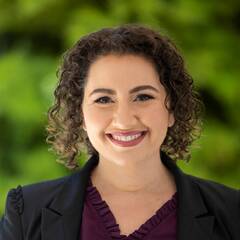Moving Forward into the Climate Crisis
10/05/2022 07:00:42 PM

Sermon, Yom Kippur Morning 2022/5783
What Can We Do? Moving Forward into the Climate Crisis
I would like to invite you to think about a place that you have been to and wish to return, like a park or a vacation spot or your grandmother’s backyard. I know many people in our community who traveled for the first time this summer and are already planning to go back to places like Yosemite, New York, Mexico, Croatia, and the UK among others. I often think about returning to Italy where I spent my honeymoon, eating all of the gelato and seeing famous works of art. I also dream of returning to Israel to walk the streets of Jerusalem and relive my Rabbinical school year there. And yet those places will not be the same because I am not the same.
Hashiveinu Adonai elecha v’nashuva chadesh yameinu k’kedem, “Turn us back, O God, return us to the days of old.” This verse from Lamentations has become an anthem for the High Holy Days. We ask God over and over again to return us to our better days, our better selves. There is so much power in the idea that we can return, that we can go home. But we have to wonder, can we actually return? The rabbis ask the same question with the same skepticism by interpreting k’kedem, the word for “days of old” into “like in the east” - like the Garden of Eden. The rabbis knew, as we do, that there is no real return, no real going back in time. But they can imagine that moment after Adam and Eve are kicked out of the Garden of Eden for eating the fruit from the tree of knowledge of good and evil as a time of resilience, a place to start again. That’s where we are right now, a place to move forward.
Our sages had an immense collective imagination that led to writing midrashim, stories to fill in the stories about our sacred texts. The rabbis conjure yet another conversation between Adam, Eve, and God in the Garden of Eden. It goes something like this, “When the Holy One created the first humans, God led Adam and Eve around all the trees of the Garden of Eden and said to them: 'Look at My works, how beautiful and praiseworthy they are! I created all of this for you. Pay attention! Do not corrupt and destroy My world: if you corrupt it, there is no one to repair it after you’” (Midrash Ecclesiastes Rabbah 7:13).
As we are taking account of our souls on Yom Kippur, this midrash calls out to us, asking if we are living up to God’s instruction to care for the earth. The answer is obvious; we have not. We are in the midst of a climate crisis and we need to talk about it.
Climate scientist, Katharine Hayoe, wrote an article entitled How to talk About Climate Change. In it she said, “Seventy-three percent of people in the US agree the planet is warming. And 62% of Americans recognize that the main reason for this warming is human activity; specifically burning fossil fuels, deforestation and agriculture.” These numbers may be higher in California where we feel the effects of climate change so acutely. Just this summer, we lived through one of the most dire droughts our state has ever seen. Water shortages affect more than 3 billion people worldwide. In the United States alone, nearly half the country is experiencing a drought after the hottest summer on record. This summer, Lake Mead—the country’s largest reservoir, formed by the Hoover Dam—recorded its lowest level since first filling in the 1930s, 200 feet below normal. The federal government has declared the first-ever shortages in the Colorado River, triggering water cuts through much of the seven-state water-sharing compact that has been in place for nearly a century. These are just a few examples of how global warming and climate change are already affecting us.
Each of these climate events are devastating on their own but put together they are downright disastrous. With a lack of water comes stronger and more frequent wildfires. We all remember the days of staying indoors because of the toxic air quality due to the fires. The number of acres burned in the US is 160% above the 10 year average. 90% of those acres have burned between Alaska and Southern California coast. The National Wildland Fire Predictive Services tells us to “expect fires this fall to spread more rapidly, and be more difficult to control.”
All of these external pressures affect our inner lives. Climate change is taking a unique toll on the mental health of all of us, especially young people. Articles and podcasts describe climate anxiety as one of the rising causes of mental health issues. They are wondering whether or not they should bring children into the world when science says we are heading for more disasters. And if they do bring children into the world, they will face a future that looks nothing like we know today. Their despair is real and their questions are valid and heartbreaking. I, too, wonder, will my children have clean drinking water? Will they have to uproot their lives to find a more livable climate? Will climate related disputes be met peacefully or will military operations rule the day?
For so long, we have been taught that the response to environmental destruction and waste is ‘reduce, reuse, recycle’. If only we could recycle enough plastic and turn off our lights more, we could save the planet. While reusing and recycling are essential, I believe we have been misinformed that: 1. recycling is enough, and 2. that it is all we can do. Government inaction and our dependence on fossil fuels have accelerated the warming of the planet. Ultimately, addressing the climate crisis requires more than separating our trash.
On this day of introspection and goal setting for the coming year, if it’s not only recycling and reducing water consumption, what else can we do? Fortunately, many things, and some of them are already under way.
Just a few weeks ago during the extreme heat, as a collective, we averted rolling blackouts by reducing our energy usage between 4 and 9pm. In August, members of Reform congregations across CA helped to pass a bill (AB 2316) that creates a community renewable energy program that gives renters access to solar energy and lower electricity bills. It also builds the reliability of our power grid and requires prevailing wages for workers – all proof that climate solutions can also grow economic justice. Think about how much more we can do. In fact, much of the technology we need to reign in greenhouse gas emissions has already been invented. What is needed most is the political will to prioritize scaling up these new technologies. This is where we can come in.
When we first started hearing about climate change, it seemed far in the future and also far away. Now, we have personal stories to tell about how the heat, drought, fires and smoky air impact us, as well as the fears we are carrying into the future. We need to talk about this - here at PTS, where we gather as a Jewish community to connect and celebrate, and also to support each other and act on our values. Hearing each others’ stories will prepare us to act as a collective, and to participate in enacting policies that will make real change in our state, country, and the world.
I’m being quite literal about telling our stories, later today during the panel we will hear from our fellow congregants and begin to tell our own. These stories do not need to be dramatic, although they might be. These stories need to be uncovered.
Here is my story:
Whenever I think about the beginning of the pandemic and the ominous, orange sky day, there is a pit in my stomach. I was pregnant with my third child and we were on week three of being inside due to poor air quality because of the wildfires and COVID. It was not only an orange day but a truly dark time. The irony of the orange day, as it is known in my house, is that the air quality was relatively good. After being cooped up all day, Brent and I decided to take our 7 year old at the time, Micah, on a walk around the neighborhood to demystify the environment. He was really excited about wearing his headlamp flashlight.
As we emerged from the house, no birds were chirping, no planes were flying overhead, the entire neighborhood was still. It wasn’t until the mail truck drove by that we saw through the truck’s headlights that ash falling like snow from the sky. We walked only a short time, too unsettled and too scared to linger for long. Brent and I felt the weight of the world on our shoulders trying to help our young sons make sense of a senseless situation with the knowledge that this would likely not be the last time it happened. Trudging up and down the hills of our neighborhood, carrying a soon-to-be life in my body, I wondered how this new person would experience our planet. I wondered how they would try to soothe their children about the scary consequences of the climate crisis that would be their legacy. Just thinking about it brings tears to my eyes.
Telling our stories will build them into our collective consciousness and help us to join with others, and do something together to address the issue.
Despite the enormity of climate change and all that comes with it, we can take the words of this morning’s Torah portion to heart, Moses said, “Surely, this Instruction which I enjoin upon you this day is not too baffling for you, nor is it beyond reach. It is not in the heavens, Neither is it beyond the sea, No, the thing is very close to you, in your mouth and in your heart, to observe it” (Deuteronomy 30:11-14).
It is not too baffling to us, it may be difficult because it is difficult, but we can start by sharing what is so close to us, what is in our hearts and our experiences, with each other. Let’s hold God’s hand in our Garden, where we live now and let us act together, so that we will be able to tell the story about how we almost corrupted God’s greatest gift to us but we were able to turn it around. We might not make it all the way to return but instead of giving up we moved forward.






